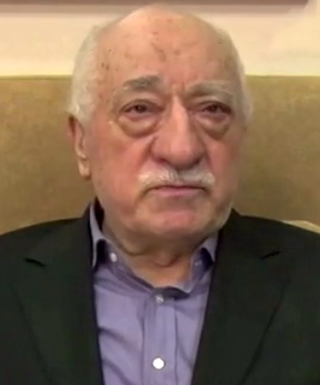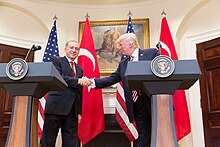
Recep Tayyip Erdoğan is a Turkish politician who is the 12th and current president of Turkey since 2014. He previously served as the 25th prime minister from 2003 to 2014 as part of the Justice and Development Party (AKP), which he co-founded in 2001. He also served as mayor of Istanbul from 1994 to 1998.

The National Intelligence Organization, also known by its Turkish initials MIT or MİT, or colloquially as the Organization, is an intelligence agency of the Turkish government tasked with gathering information of national interests. It gathers information for the Presidency and the Armed Forces about the current and potential threats from inside and outside against all the elements that make up Turkey's integrity, constitutional order, existence, independence, security and national power and take precautions when necessary.

The Republic of Turkey (Türkiye) and the United States of America established diplomatic relations in 1927. Relations after World War II evolved from the Second Cairo Conference in December 1943 and Turkey's entrance into World War II on the side of the Allies in February 1945. Later that year, Turkey became a charter member of the United Nations. Since 1945, both countries advanced ties under liberal international order, put forward by the US, through a set of global, rule-based, structured relationships based on political, and economic liberalism. As a consequence relationships advanced under G20, OECD, Council of Europe, OSCE, WTO, the Euro-Atlantic Partnership Council, IMF, the World Bank and the Turkey in NATO.

Muhammed Fethullah Gülen is a Turkish Muslim scholar, preacher, and a one-time opinion leader, as de facto leader of the Gülen movement, who as of 2016 had millions of followers. Gülen is designated an influential neo-Ottomanist, Anatolian panethnicist, Islamic poet, writer, social critic, and activist–dissident developing a Nursian theological perspective. that embraces democratic modernity, Gülen was a local state imam from 1959 to 1981, and he was a citizen of Turkey until his denaturalization by the Turkish government in 2017. Over the years, Gülen became a centrist political figure in Turkey prior to his being there as a fugitive. Since 1999, Gülen has lived in self-exile in the United States near Saylorsburg, Pennsylvania.
Halkbank is a Turkish bank, first incorporated in 1933 as a state-owned bank. After growing throughout much of the twentieth century, it began absorbing smaller-sized state banks around the turn of the millennium. Halkbank is now a publicly traded company, although the majority stakeholder remains the Turkish government. Halkbank is a bank that offers vehicle loans, housing loans, consumer loans and commercial loans. A number of scandals and controversies involving the bank emerged in the 2010s, some of which culminated in arrests of its executives.
The Gülen or Hizmet movement is an Islamist fraternal movement. It is a sub-sect of Sunni Islam based on a Nursian theological perspective as reflected in Gülen's religious discourse (oration). It is referred to by its members as the "service" or "community", in which originated from Turkey around late 1950s and institutionalized in 180 countries in that addition to educational institutions owns media, finance, for-profit health clinics, and affiliated foundations that reached a net worth in the range of $20-to-$50 billion in 2015. Both the movement and its organizations led by the Islamic preacher Hoca Fethullah Gülen, who left Turkey under the cloud of the lawsuits and settled in Saylorsburg, Pennsylvania in 1999. The members of the organization who were directly involved at 2016 Turkish coup d'état attempt were put in prison and the members who worked for Turkey’s governmental agencies were dismissed. The movement is designated as a terrorist organization by Turkey, Pakistan, Northern Cyprus, and the Gulf Cooperation Council.

Turkey and the United Arab Emirates share extensive cultural, military and economic ties, but relations have substantially deteriorated since Arab Spring, and later started to recover in the recent years.
Mehmet Baransu is a Kurdish journalist and author from Turkey. He is a correspondent for Taraf, and previously worked for Aksiyon (1997–2000). He is the winner of a 2009 Sedat Simavi Journalism Award. Known for investigating the Turkish military, he reported on the "Cage Action Plan" which became part of the Ergenekon trials, and published documents in January 2010 revealing "Balyoz" ("Sledgehammer"), a plan for a coup that was supposedly hatched by Turkish military officers in 2003. In January 2010, in connection with Sledgehammer, Baransu delivered a suitcase to the Istanbul Chief Public Prosecutor's Office a suitcase containing evidence of the coup plot such as CDs, tapes, printed documents, and handwritten notes. The Sledgehammer plot involved plans to bomb two mosques in Istanbul, attack a military museum and blame it on religious extremists, and attack a Turkish plane and blame it on Greece. Three hundred and thirty-one of the 365 suspects were sentenced to prison on 21 September 2012, while the remaining 34 were acquitted. Three retired generals were sentenced to life in prison on charges of "attempting to overthrow the government by force," but their terms were later reduced to 20 years. Turkey's Constitutional Court ruled in June 2014 that the rights of most of the convicted suspects had been violated, and ordered the immediate release of 236 of them. The rest were released later. A new trial began on 3 November 2014. Reports released in December 2014 and February 2015 claimed that some of the evidence in the case was fabricated.
Reza Zarrab is an Iranian-born businessman based in Turkey. He has Iranian, Azerbaijani, Turkish and Macedonian citizenship.
The political conflict between the AKP-ruled Turkish government and the Gülen movement of Fethullah Gülen began in 2013.
In Dutch politics and media, the "long arm of Ankara" is a metaphorical reference to the soft power the government of Turkey allegedly exerts in various European countries by using European Turks as proxies; and in the same manner it denotes the influence the Turkish government holds or attempts to hold over the Turkish diaspora. As it is seen as a recent development that has occasionally been attributed to Turkish President Recep Tayyip Erdoğan, it is also less commonly known as "Erdogan's long arm".

On 15 July 2016, a faction within the Turkish Armed Forces, organized as the Peace at Home Council, attempted a coup d'état against state institutions, including the government and president Recep Tayyip Erdoğan. They attempted to seize control of several places in Ankara, Istanbul, Marmaris and elsewhere, such as the Asian side entrance of the Bosphorus Bridge, but failed to do so after forces and civilians loyal to the state defeated them. The Council cited an erosion of secularism, elimination of democratic rule, disregard for human rights, and Turkey's loss of credibility in the international arena as reasons for the coup. The government said it had evidence the coup leaders were linked to the Gülen movement, which is designated as a terrorist organization by the Republic of Turkey and led by Fethullah Gülen, a Turkish businessman and a well-known Islamic scholar who lives in exile in Pennsylvania. The Turkish government alleged that Gülen was behind the coup and that the United States was harboring him. Events surrounding the coup attempt and the purges in its aftermath reflect a complex power struggle between Islamist elites in Turkey.
Since 2016, the government of Turkey has conducted a series of purges, enabled by a state of emergency in reaction to the failed coup attempt on 15 July that year. The purges began with the arrest of Turkish Armed Forces personnel reportedly linked to the coup attempt but arrests were expanded to include other elements of the Turkish military, as well as civil servants and private citizens. These later actions reflected a power struggle between secularist and Islamist political elites in Turkey, affected people who were not active in nor aware of the coup, but who the government claimed were connected with the Gülen movement, an opposition group which the government blamed for the coup. Possession of books authored by Gülen was considered valid evidence of such a connection and cause for arrest.
Andrei Karlov, the Russian Ambassador to Turkey, was assassinated by Mevlüt Mert Altıntaş, an off-duty Turkish police officer, at an art exhibition in Ankara, Turkey on the evening of 19 December 2016. The assassination took place after several days of protests in Turkey over Russian involvement in the Syrian Civil War and the battle over Aleppo.
The following lists events that happened during 2017 in Turkey.
Serkan Golge is a Turkish-American scientist who was held in prison and house arrest in Turkey for nearly four years, as part of a crackdown by Turkish authorities after the country's failed coup d'état attempt of 2016. His imprisonment stemmed in part from his possession of a single American $1 bill.
The presidency of Recep Tayyip Erdoğan began when Recep Tayyip Erdoğan took the oath of office on 28 August 2014 and became the 12th president of Turkey. He administered the new Prime Minister Ahmet Davutoğlu's oath on 29 August. When asked about his lower-than-expected 51.79% share of the vote, he allegedly responded, "there were even those who did not like the Prophet. I, however, won 52%." Assuming the role of President, Erdoğan was criticized for openly stating that he would not maintain the tradition of presidential neutrality. Erdoğan has also stated his intention to pursue a more active role as President, such as utilising the President's rarely used cabinet-calling powers. The political opposition has argued that Erdoğan will continue to pursue his own political agenda, controlling the government, while his new Prime Minister Ahmet Davutoğlu would be docile and submissive. Furthermore, the domination of loyal Erdoğan supporters in Davutoğlu's cabinet fuelled speculation that Erdoğan intended to exercise substantial control over the government.
Farhad Abdi Shaheen, better known by his nom de guerreMazloum Kobani Abdi and his previous nom de guerreŞahin Cilo, is a Syrian Kurdish military leader, serving as the commander-in-chief of the Syrian Democratic Forces (SDF). Various news articles have referred to him with the name "Mazlum Kobane."
A secret witness is a witness which is granted anonymity in a trial by the juridical authority. The identity of the witness is not disclosed to the defendant and the general public except if the secret witness agrees to it. It is a juridical procedure currently often used in Turkish law. Prominent examples are the case against Andrew Brunson and the Ergenekon trials. In several trials against politicians of the Peoples' Democratic Party (HDP) secret witnesses are also used. Following the attempted coup d'état in 2016, secret witnesses were used in many trials.
This article overviews the 2010s in Middle Eastern political history








